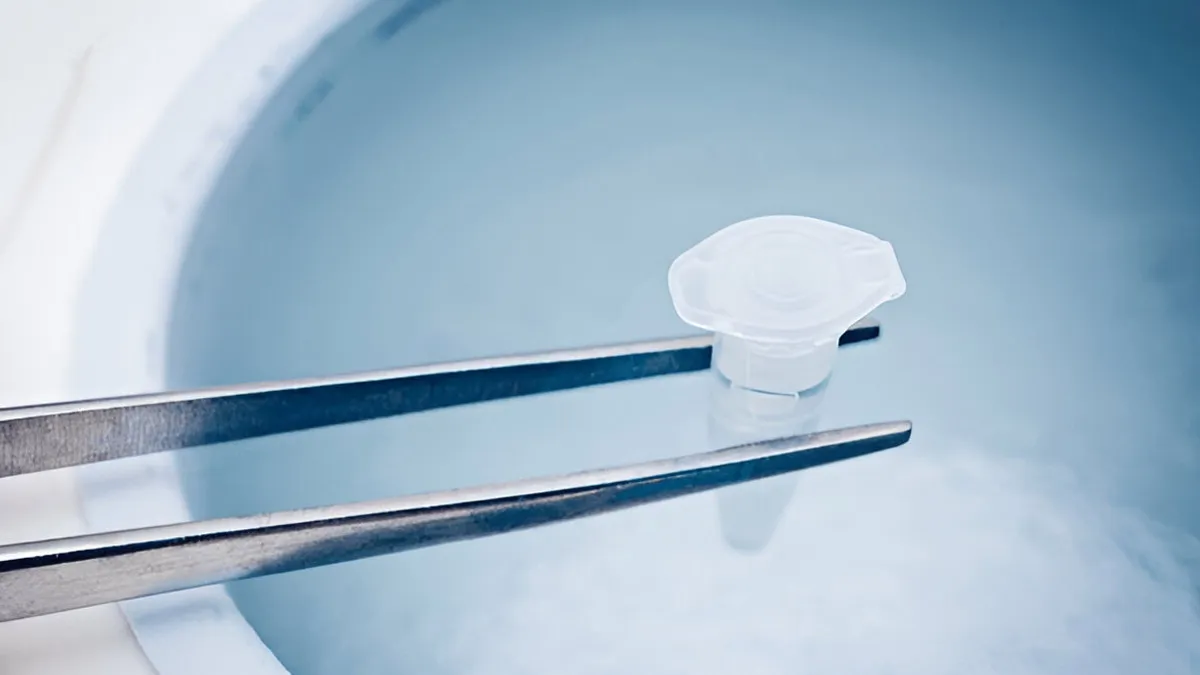
When people talk about fertility, it’s almost always about women: egg freezing, biological clocks, hormone tests, but let’s be real, men aren’t immune to the ticking clock either. We just don’t talk about it enough. Sperm freezing, or cryopreservation, is slowly coming into the spotlight, and for good reason. There are several reasons for it, including career priorities, lifestyle choices, or health concerns; more men today are taking control of their future fatherhood.
Table of Content:-
If you’ve ever asked yourself, “Is sperm freezing something I should think about doing?” or even “Wait, how does that even work?”, you’re totally in the right spot!
We spoke to Dr Vaishali Sharma, Senior Gynecologist and IVF Specialist, MD (AIIMS), who explained sperm freezing, benefits, the process, and myths associated with it.
What Is Sperm Freezing?

“In the simplest terms, sperm freezing is like creating a ‘backup file’ of your fertility. A sample of your sperm is collected, which undergoes the process of freezing at super low temperatures using liquid nitrogen, and then stored safely for years until it’s time to use. When it’s needed later for IVF, ICSI, or IUI, it’s thawed and used just like fresh sperm,” said Dr Sharma.
Sperm can be kept frozen for decades without losing quality. There have even been successful pregnancies with sperm that had been frozen for over 20 years!
Also Read: Boxers Or Briefs: Which Can Cause Low Sperm Count?
How Does It Work?
Collection of Samples
This refers to the process where you’ll be providing a semen sample, usually at the clinic (yes, in a private room with magazines or, more realistically, your phone).
Sperm Health Testing
“It is the procedure in which the lab tests your sperm for different parameters of health, such as its count, movement, and morphology. They want to preserve only the healthiest ones because they are obviously the most viable, hence this is a crucial step in the process,” added Dr Sharma.
Sperm Freezing
The tested healthy and viable sperm is then mixed with a protective solution and cooled to a temperature of -196°C using liquid nitrogen. At that temperature, life just pauses.
Containment/Storage of Sperm
It’s then stored in a cryogenic tank for as long as you want: 5, 10, even 20 years.
Future Use
When you think you’re ready, the sperm is thawed, tested again, and used for treatments like IVF.
Why Is Sperm Freezing So Popular Nowadays?

“Today’s men are postponing marriage and parenthood, prioritising their careers, exploring travel opportunities, or taking time to navigate life. Fertility isn’t the first thing on anyone’s mind at 25, but sperm quality does decline with age (more on that later),” said Dr Sharma.
The main reasons men freeze sperm today:
- Medical treatments like cancer therapy or testicular surgery.
- Lifestyle: Extended work hours, stress, and environmental toxins can harm the sperm health.
- Preplanned backup for IVF cycles or family planning later in life.
- “Why not?” mindset: Some reasonable men just like having the reassurance that they’ve preserved their fertility and hence, the possibility of fatherhood while they’re young.
When Should a Man Consider Freezing Sperm?
Here’s the thing: you don’t have to wait for a crisis or a diagnosis. The best time is when you’re healthy and in your prime.
If you’re between 20 and 35, your sperm is likely at its peak quality, with better motility and fewer DNA defects. After 40, sperm DNA fragmentation increases, and conception might take longer. So, if you know you want kids someday but not right now, it’s worth considering sooner rather than later.
Does Sperm Quality Really Change with Age?

Even though men are technically capable of fathering children even in their 50s or even 60s, the uncertainties and risks do tend to increase. For example, older sperm is more prone to DNA damage, which can therefore impact embryo quality, increase miscarriage risk, and in some studies, even link to certain childhood disorders.
Freezing your sperm while you’re young means you’re locking in a version of your seed when you are at the healthiest reproductive stage of your life.
Popular Myths About Sperm Freezing
Myth 1: “Frozen sperm can’t work as well as fresh sperm.”
This is entirely illogical. With modern techniques, frozen sperm works just as effectively for IVF or ICSI.
Myth 2: “It’s too expensive for the average guy.”
Not true, especially in India. It’s cheaper than you think (we’ll get into the numbers soon).
Myth 3: “It’s only for men with fertility problems.”
No, perfectly healthy men are now freezing sperm as part of long-term family planning, just like women freeze eggs.
How Affordable and Accessible Is It in India?
One of the excellent things about being in India is that modern and advanced fertility treatments are far more affordable here compared to the U.S. or Europe.
- Initial Testing: ₹5,000
- Initial freezing- ₹15,000
- Annual Storage Fees: ₹10,000.
- Thawing for IVF later: ₹5,000.
In countries like the US, this same process could cost at least 4–5 times more. So, yes, it’s accessible and cost-effective here.
Could Frozen Sperm Work as Well as Fresh Sperm?
Most fertility clinics have shared reports of similar success rates with frozen sperm, provided the initial semen sample was of viable healthy quality. This is why donor sperm banks rely entirely on frozen sperm Hence, to sum it up in simpler words, it works almost the same.
What Are the Costs Involved?
Let’s talk about the average breakdown simply costing for this process:
- Testing and the process of initial Freezing: Testing costs ₹5,000 and initial Freezing costs are just ₹15,000.
- Yearly storage charges: ₹10,000.
- Future thawing and using: ₹5,000.
In short, for the price of a nice weekend trip, you can preserve your fertility for decades. That’s not a bad deal.
Bottomline
Dr Sharma concluded, “If you’ve ever thought, “What if I wait too long?”, sperm freezing is a way to take control of that uncertainty. It’s not just for men with health issues; it’s for anyone who wants the option to start a family later without worrying about age catching up. It’s 2025. Reproductive planning isn’t just for women anymore. Men have options too, and sperm freezing is one of the smartest, simplest ways to future-proof fatherhood.”
[Disclaimer: This article contains information provided by an expert and is for informational purposes only. Hence, we advise you to consult your professional if you are dealing with any health issue to avoid complications.]
Also watch this video
How we keep this article up to date:
We work with experts and keep a close eye on the latest in health and wellness. Whenever there is a new research or helpful information, we update our articles with accurate and useful advice.
Current Version